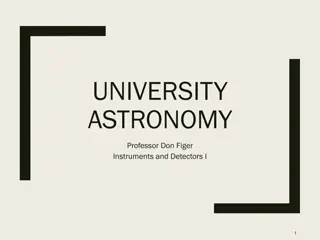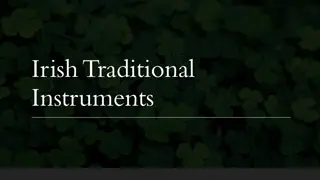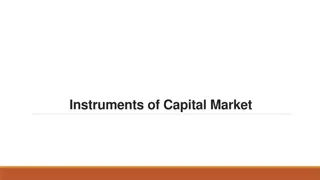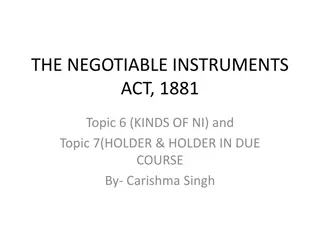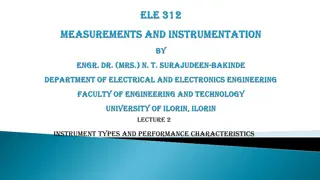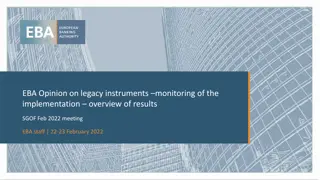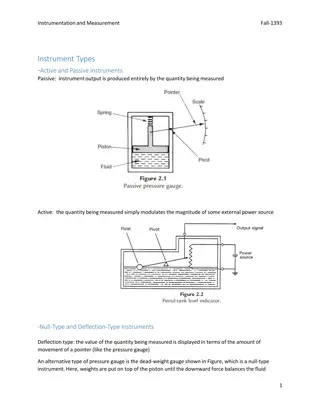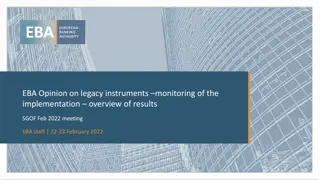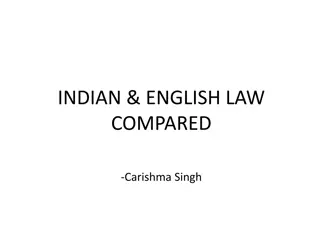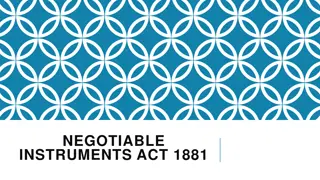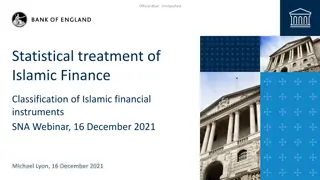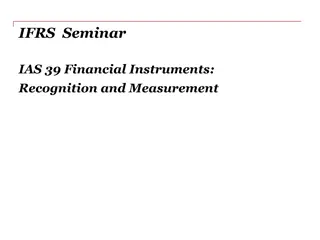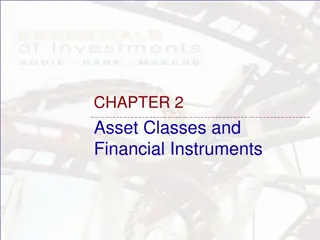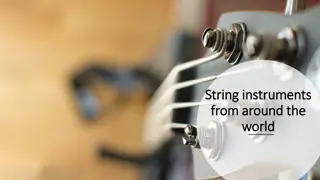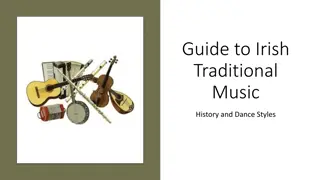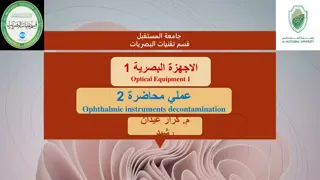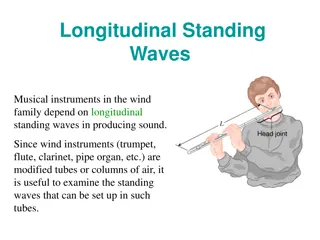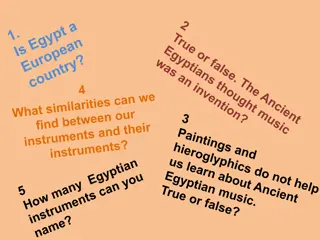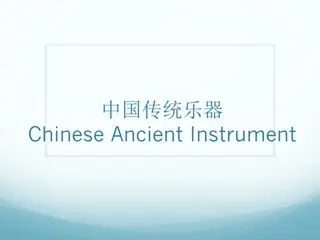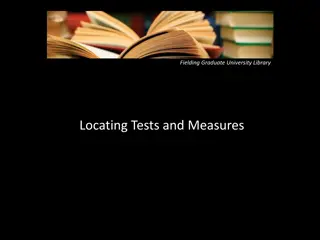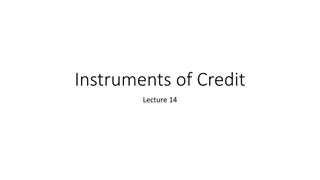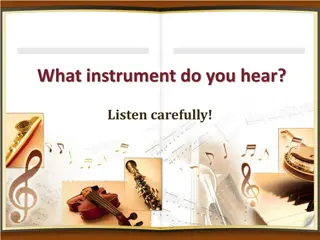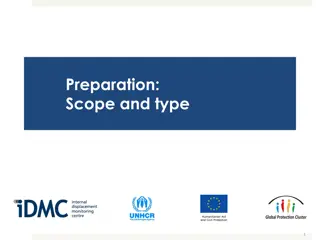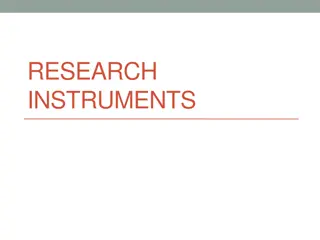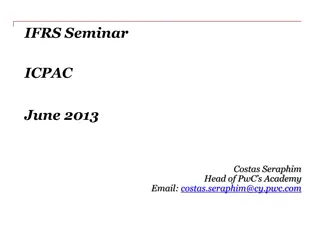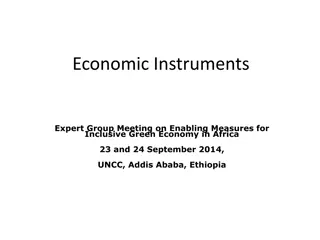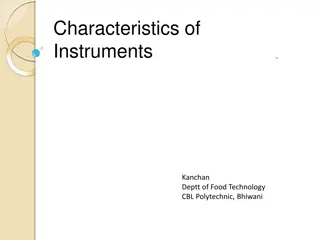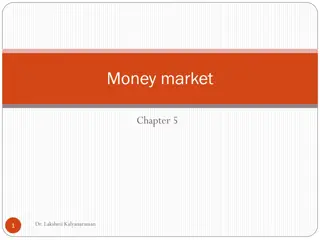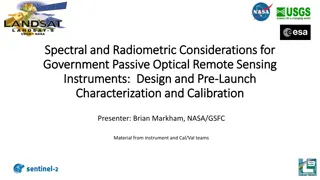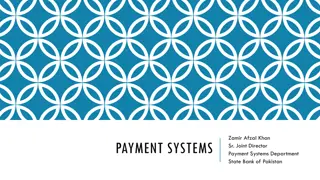European Spallation Source Neutron Instrument Project Overview
The European Spallation Source (ESS) Neutron Instrument Project aims to develop 15 world-leading neutron instruments by 2023. The project involves instrument classes, performance targets, budget considerations, and a planned schedule for instrument commencement. The NSS project scope includes reduci
4 views • 18 slides
Forensic Analysis Instruments: Microscope vs. Borescope
Instruments like the stereomicroscope, comparison microscope, and borescope are used in forensic analysis for individual examination, side-by-side comparison, superimposition, and barrel analysis. The comparison microscope is utilized for analyzing fired cartridge cases, while the borescope helps in
0 views • 8 slides
Understanding Modern Optical and Infrared Astronomy Instruments
This presentation by Professor Don Figer explores modern optical and infrared instrumentation used in astronomy, including cameras, spectrographs, and specialized devices like coronagraphs. It covers instruments such as HST, Spitzer, Chandra, JWST, ELTs, and WFIRST, highlighting their capabilities i
0 views • 40 slides
Explore Irish Traditional Instruments and Music
Discover the diverse world of Irish traditional instruments such as the Flute, Fiddle, Tin Whistle, Low Whistle, Uilleann Pipes, Accordion, Concertina, Bodhrán, and Harp. Learn about the history and unique characteristics of these instruments, as well as the evolution of Irish music to include mode
0 views • 12 slides
Understanding Various Instruments of the Capital Market
Equity shares, preference shares, debt capital, equipre, sweat equity shares, and global depository receipts are key instruments in the capital market. Each type offers unique features and benefits for investors and companies alike, influencing ownership, dividends, voting rights, and trade facilita
0 views • 6 slides
Understanding the Negotiable Instruments Act, 1881: Types of Instruments and Holders
The Negotiable Instruments Act, 1881 was enacted to provide legal recognition to credit instruments easily transferable as money. It defines negotiable instruments like promissory notes, bills of exchange, and cheques, including local usages. Instruments can be negotiated multiple times until maturi
0 views • 25 slides
Understanding Instrument Types and Performance Characteristics
This content discusses different types of instruments, including active and passive, null-type and deflection-type, analog and digital, as well as smart and non-smart instruments. It delves into the static characteristics of instruments such as accuracy, precision, tolerance, linearity, and sensitiv
2 views • 39 slides
EBA Opinion on Legacy Instruments Monitoring Implementation Overview - Feb 2022 Meeting
The European Banking Authority (EBA) provided an opinion on legacy instruments monitoring at their Feb 2022 meeting. The presentation covers the monitoring in 2021, surveys, letters to competent authorities, and the overview of monitoring results. It discusses calls for input on the implementation o
0 views • 20 slides
Understanding Instruments in Instrumentation and Measurement
Passive and active instruments play key roles in measurement, with null-type and deflection-type instruments providing different ways to display values. Analogue and digital instruments offer varying outputs, while indicating instruments and those with signal outputs serve different purposes. Smart
2 views • 12 slides
Overview of EBA Opinion on Legacy Instruments Monitoring Implementation Results Feb 2022
In February 2022, the European Banking Authority (EBA) conducted monitoring on legacy instruments implementation. The presentation covers surveys, input from competent authorities, and outcomes. Efforts to address infection risks posed by legacy instruments were highlighted, with actions taken by in
2 views • 20 slides
A Comparison of Indian and English Law on Holders of Negotiable Instruments
The Indian and English laws regarding the definition and rights of holders of negotiable instruments are compared through key sections from the Negotiable Instruments Act, 1881, and the Bills of Exchange Act, 1882. Both Acts define the holder as the payee, endorsee, or bearer entitled to possess the
0 views • 11 slides
Understanding the Negotiable Instruments Act 1881
The Negotiable Instruments Act of 1881 governs transferable written documents in India. It outlines the characteristics of negotiable instruments, such as payment methods and legal implications. Promissory notes, a key component, require specific features for validity. Learn more about this fundamen
1 views • 10 slides
Statistical Treatment of Islamic Financial Instruments
Explore the classification and examples of Islamic financial instruments, such as Restricted Mudaraba and Waqf Funds. Understand the scope, process, and economic substance of these instruments, along with their classification in terms of financial assets and liabilities. Learn how to analyze and cla
0 views • 10 slides
Evolution of Planning Systems and Instruments in Hungary with EU References
Explore the evolution of planning systems and instruments in Hungary with special reference to EU integration. Discover the varied domestic planning systems within EU traditions and the introduction of diverse instruments from 2002 to 2017, as analyzed by Gza Salamin. Learn about the European Model
0 views • 15 slides
Understanding IAS 39: Financial Instruments Recognition and Measurement
This content provides an overview of an IFRS seminar on IAS 39, focusing on key concepts such as the classification and measurement of financial assets, impairment, reclassification, and more. It covers definitions of financial instruments, financial assets, equity instruments, and financial liabili
1 views • 43 slides
Evolution of Orchestra: From Ancient Egypt to Modern Times
The evolution of orchestras dates back to ancient Egypt, with the Roman Empire showing disdain towards musicians. Instrument families emerged in the eleventh century, while the Middle Ages saw the grouping of specific instrument families. Modern orchestras began in the late sixteenth century, with s
0 views • 24 slides
Understanding Financial Instruments and Markets
Explore asset classes like fixed income securities, money market instruments, and capital market instruments. Learn about different financial instruments in various markets including money market, bond market, equity markets, and derivative markets. Dive into money market instruments like Treasury b
0 views • 47 slides
Understanding Measurement and Instruments in Research
Exploring the significance of instruments in research, this content delves into the development and utilization of measures for concepts like caring. It covers the various devices used to measure constructs, the rules governing measurement assignment, direct versus indirect measurement methods, and
2 views • 64 slides
Exploring String Instruments from Around the World
Delve into the enchanting world of string instruments from different cultures. Discover the Erhu from China, with its 4,000-year history and unique playing style. Explore the Morin Khuur from Mongolia, known for its horse-head design and pairing with throat singing. Journey to Pakistan to learn abou
0 views • 14 slides
History and Evolution of Irish Traditional Music
Irish traditional music has a rich history dating back to the ancient times when primitive musical instruments were used for signaling and entertainment. The arrival of the Celts introduced significant instruments like the harp, shaping the musical culture of Ireland. Over the centuries, various tra
0 views • 14 slides
Ophthalmic Instruments Decontamination Guide
Decontamination of optical equipment and ophthalmic instruments is crucial to ensure their safe reuse, preventing healthcare-acquired infections. This guide covers steps like cleaning, disinfection, and sterilization using various methods such as chemical and physical processes. Proper care and hand
0 views • 15 slides
Analyzing Opposition to Musical Instruments in Worship
The opposition to using musical instruments in worship is based on beliefs stemming from biblical references that emphasize singing, the lack of explicit authorization for instruments in the Bible, and arguments regarding the essence of worship as prescribed by God. Various scriptures and interpreta
0 views • 19 slides
Understanding Longitudinal Standing Waves in Musical Instruments and the Human Ear Canal
Musical instruments in the wind family rely on longitudinal standing waves to produce sound, with wind instruments like trumpet, flute, clarinet, and pipe organ being modified tubes of air. This article explores the concept of standing waves in open tubes of air and their relevance to instruments an
0 views • 4 slides
Explore Ancient Egyptian Music Through Art and Instruments
Uncover the fascinating world of Ancient Egyptian music by delving into wall paintings, artifacts, and hieroglyphics that offer glimpses into the musical instruments played and activities conducted. Discover the myths and truths surrounding the origins of music in Ancient Egypt, and draw parallels b
0 views • 22 slides
Explore Traditional Chinese Musical Instruments
Discover the beauty and history of traditional Chinese musical instruments such as the Zeng-hou-yi bells, Sheng, Guqin, Guzheng, Xiao Flute, Pipa, and Erhu. Learn about their unique characteristics, cultural significance, and listen to their enchanting melodies through informative videos. Immerse yo
0 views • 10 slides
Fielding Graduate University Library - Resources for Locating Tests and Measures
Fielding Graduate University Library provides access to various sources for locating research instruments such as tests and surveys. The library offers information on how to find actual tests, descriptions of instruments, and where to access them, including databases like Mental Measurements Yearboo
0 views • 13 slides
Understanding Credit Instruments and Negotiable Instruments
Credit instruments play a crucial role in modern business by facilitating the transfer of money between lenders and borrowers. These instruments, such as Payroll Credit, Book Credit, and Documentary Credit, come in various forms like oral agreements and written documents. Negotiable instruments, on
0 views • 11 slides
Understanding Timbre in Musical Instruments
Explore the concept of timbre in musical instruments, including how different instruments produce unique sounds through vibration. Learn about woodwind, brass, and string families, and use descriptive words to describe timbre qualities. Enhance your knowledge of how instruments such as clarinet, obo
0 views • 12 slides
Understanding National Instruments for Internal Displacement
This presentation delves into the types and scope of national instruments for internal displacement, emphasizing the need for a tailored approach based on the country's legal framework. It explores the characteristics of effective instruments, discusses comprehensive versus partial approaches, and e
0 views • 8 slides
Advancements in Plasma Instruments for Space Weather Monitoring
Explore the latest developments in plasma instruments for space weather monitoring, including the PLA Plasma Instrument and MSSL Heritage in Plasma Instruments. These instruments enable precise measurement of plasma parameters in deep space, supporting missions to study solar wind, ion densities, an
0 views • 22 slides
Presumptions in Negotiable Instruments under the Negotiable Instrument Act
Sections 118 and 119 of the Negotiable Instrument Act outline various presumptions made by the court regarding negotiable instruments. These presumptions include consideration, date, time of acceptance, time of transfer, order of endorsement, stamp duty, and holder in due course. These presumptions
0 views • 7 slides
Understanding Research Instruments in Academic Studies
Research instruments play a crucial role in academic research by helping researchers collect data effectively. These instruments need to be valid, reliable, and usable to ensure accurate results. Different types of research instruments exist, including questionnaires, interviews, and checklists. Val
0 views • 25 slides
Understanding Financial Instruments in IFRS: Key Concepts and Overview
This content provides an overview of financial instruments under IFRS, focusing on their classification as assets, liabilities, or equity. It explains the presentation of compound financial instruments and outlines key concepts related to financial assets, financial liabilities, and equity instrumen
0 views • 28 slides
Transforming Towards an Inclusive Green Economy: Economic Instruments Expert Group Meeting in Africa
Transitioning to an inclusive green economy involves using economic instruments like taxes, incentives, and subsidies to stimulate green investments and promote sustainable practices across various sectors. This entails creating incentives, addressing market failures, and generating financial resour
0 views • 11 slides
Driving Economic Recovery with Recapitalisation Instruments for Smaller EU Corporates
Amid the aftermath of the Covid-19 pandemic, the need for recapitalisation instruments for smaller EU corporates has become apparent. These instruments, such as equity and hybrid options, can provide essential fresh capital for companies to invest in innovation and drive economic growth. AFME's expl
0 views • 12 slides
Understanding Negotiable Instruments: Law and Characteristics
The Negotiable Instruments Act of 1881 governs the law related to negotiable instruments in India. These instruments are transferable written documents entitling the holder to a certain sum of money. Characteristics include free transferability, title free from defects, transferee's right to sue, an
0 views • 34 slides
Understanding Characteristics of Instruments in Food Technology
Exploring the static and dynamic characteristics of instruments in the field of Food Technology is crucial for accurate measurements. Static characteristics include stability, range, accuracy, sensitivity, reproducibility, hysteresis, precision, and more. On the other hand, dynamic characteristics f
0 views • 32 slides
Understanding Money Market Instruments and Yields
Money market instruments are short-term debt securities with high liquidity, low risk, and issued by high-quality borrowers. These instruments offer a higher return than cash holdings, making them attractive for investors. Bond equivalent yields provide a way to compare different types of securities
0 views • 30 slides
Spectral and Radiometric Considerations for Government Remote Sensing Instruments
This presentation explores the important considerations in designing and calibrating government passive optical remote sensing instruments, focusing on spectral and radiometric aspects. Topics include spectral variation, design considerations, uniformity, reflectance calibration, and examples from i
0 views • 27 slides
Overview of Payment Systems and Instruments
Explore the world of payment systems, instruments, and their relationships in the financial market. Understand the characteristics of payment instruments, such as cash, cards, credit transfers, and digital currencies. Dive into the security features of payment cards and the technology behind fraud p
0 views • 30 slides


